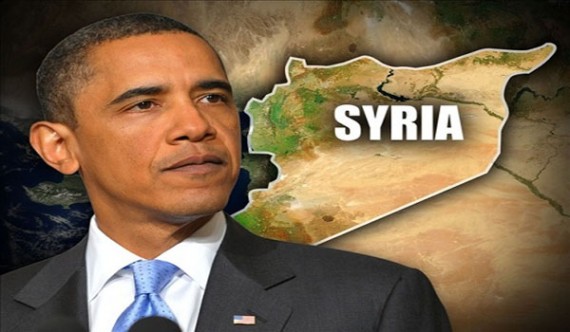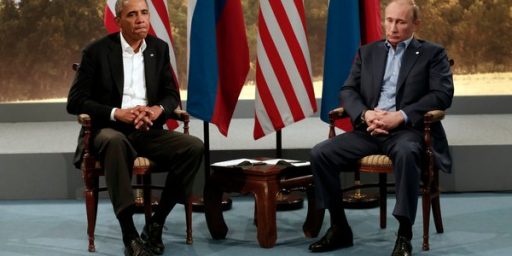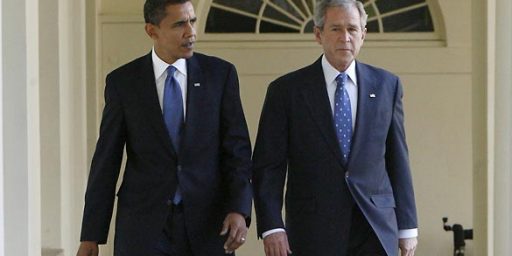The Problem of Secrecy
Persuasion is sometimes an important part of being president.
Rather few people outside the national governments of the United States, the United Kingdom, and France seem to want those three countries to take military action against Syria. The people of the United States oppose the use of military force against Syria. The Brits are opposed to it. I have been unable to nail down French public opinion on the subject. This article at Le Monde seems to be a rather frantic attempt at finding legal justification for an attack. Rather than translating it for you the gist appears to be that they find that justiification in the “collective security” provisions of the relevant Geneva Conventions which seems to me to be a rather slender branch. It may make more sense from the standpoint of French law.
Public opinion in the Middle East largely opposes it. Syrian refugees support it The governments of Middle Eastern countries may quietly support such action but they’re keeping their cards close to their vests.
As I’ve pointed out before, the Russian position appears to be that the UN inspectors should be allowed to do their work (that’s due on Saturday) and that military action against Syria in the absence of a Security Council resolution to that effect would be illegal. The Russians are expected to veto such a resolution.
The position of the Chinese seems to be similar to that of the Russians.
The Italian government seems to be taking a position not dissimilar from that of the Russians with the exception of giving the impression that they’d support military action if a reasonable case could be made.
The Germans appear to be skeptical:
“Humanitarian wars are also wars. Those who jump into them for moral reasons should also want to win them. Cruise missiles fired from destroyers can send a message and demonstrate conviction, but they cannot decide the outcome of a war. Neither can a “we’ll see” bombardment. There has to be a strategic motivation behind the moral one, and it demands perseverance.”
“There are plenty of possible strategic considerations. One is that of challenging Russia and Iran, both of which are pursuing the cold calculation of saving Assad to increase their own influence in the region. For the Obama administration, another motivation is that of demonstrating America’s weight in the region following years of retreat. Then there is the consideration of keeping Israel from launching its own, ill-considered attack. Thus, the Assad regime must go — and the Iranian/Russian bridgehead along with it. This, of course, would merely be the first war. After that, a second one would have to be fought against al-Qaida and the Al-Nusra Front to prevent the country from becoming a source of Islamist terror.”
“Following this logic shows that there is no such thing as a short and cheap war…. Moral imperative versus interests and ability: the gas attacks change little in this conundrum. Doing nothing is also not a solution. But whatever is done should be well considered. Entering a war is always easier than winning it.”
Under the circumstances, particularly in the light of the experience of a decade ago, it would appear prudent for President Obama to articulate his case for military action against Syria to the American people.
Governments keep secrets. Whether we approve of that or not it is a fact and governments will continue to keep secrets. There are good reasons to keep secrets. For example, revealing information might reveal its source. Or it might reveal to potential adversaries how much you actually know. Or don’t know.
However, not every reason that governments keep secrets is a good one. Force of habit. Distrust of the people. Some have suggested that our source for Assad’s use of chemical weapons is a foreign intercept of Syrian official communications, kindly provided by an unnamed Israeli source. It’s hard for me to see what the Israelis would have to gain from having Assad replaced by the rebels.
The point is that the more secrecy surrounds whatever information we have about the source and nature of chemical weapons attacks in Syria the more speculation there will be about that information and any actions taken based on it.
The more authoritarian a government is, the less of a problem secrecy presents for that government. It’s easier to keep secrets and your need to justify your actions is decreased. Contrariwise, the more democratic the government, the greater the problem that official secrecy presents, the ultimate hazard being to challenge the legitimacy of the government itself.
There are differing views on just what the role of representatives in a representative democracy is. For some, representatives are elected to use their own judgment. For others, they are elected to do the will of the people. The practical approach, I think, is somewhere in between. Under most circumstances representatives should be able to follow their own judgment. There are instances, however, under particularly grave circumstances in which a representative should feel the obligation to follow the will of the people.
The president, too, is a representative of the people. The president is the only official elected at large. That places an even greater obligation on the president to, when the circumstances are grave and public opinion is against him or her, make his or her case to the people.
I think that before taking military action against Syria the president should wait for the UN inspectors’ report, try to secure approval from the Congress, and try to secure approval from the United Nations Security Council. If none of those support the actions he intends to take, he should then do as he sees best, in the full recognition that there may be consequences to those decisions.
Update
Pursuant to comments the second paragraph has been expanded and amended to include supporting evidence for the claim as well as the original evidence presented which actually contradicts the claim.







According to the Telegraph, the administration will be releasing a full dossier this afternoon (its now 11 AM where I am). Lets see what secrets TPTB consider worth releasing before falling down the secrecy rabbit hole. Hopefully it will be more detailed than the UK’s Joint Intelligence Committee letter.
Would change the words “may be consequences” to “will be consequences” in your last paragraph. Playing with matches near powder kegs is not a good idea.
I find the OP’s complete erasure of the Syrian people themselves – presumably many of them are quite in favor of intervention, no? – rather telling.
Ironically, the only public opinion in the Middle East referenced in the linked article is a protest by Syrian refugees in support of intervention.
“British intelligence has learned…………..”
@walt moffett: Hopefully more detailed indeed. I did not find the British summary very illuminating.
I’m still scratching my head over this. Am wondering if Obama is carrying out the saber-rattling to a) undercut the Republican hawks b) flush out the opposition c) float a trial rocket d) give a signal to Assad that he’s really, really better apologize/draw back/whatever. I’m not going to worry until the actual attacks occur. This looks more to me like the stereotypical bar fight, where the two “combatants” are screaming Let Me At Him! knowing full well they’re being firmly held back by other people.
I’d also like to know who in the military thinks this is a good idea. Do they think this simply a case of dropping a few bombs, declaring victory, and going home?
I can easily believe some hothead in Assad’s army going ahead and giving the order to gas without thinking and now the rest of the army (and Assad) think they have to support him otherwise they’ll show how little control they have over the guys under them. (e.g. see Manchurian Incident, WWII. Started by a bunch of young hotheads in the Japanese Army under precisely these circumstances.)
Some possibilities:
1) He’s not “explaining” because the explanation is that we’d just as soon the war went on and its for that reason we hope to deprive Mr. Assad of chemical weapons. Not something we want to talk about publicly, that.
2) He’s not explaining because we’ve decided that a fragmented Syria isn’t such a bad option after all. But we can hardly say that out loud.
3) He’s taking his time, either because he always does, or because delaying allows the rebels to prepare an offensive to capitalize on the strikes.
Speculation, obviously.
Let me paraphrase. Decisions of this magnitude are tough, involving imperfect information, conflicting interests, and internal politics. Well, yeah.
And then…….. in “grave” situations follow the will…………but after consulting with wise people…….”go it alone and accept the consequences.” Well, yeah.
But listen to our president. I have determined……I have not made a decision…….the evidence is clear……uh, but…………a red line………..but….. Muddled and confused. Fearless Leader could do better.
Given the stakes implicit and outlined in your blogpost, could we not do better than this guy? He’s all politics, all the time.
.
@Drew:
You base that on nothing objective, just your own tedious and unsupported contempt.
A brief review of Obama on foreign policy:
1) Ended one disastrous war begun and then botched by those wise old hands, Mr. Bush, Mr. Cheney and Mr. Rumsfeld.
2) Is winding down a second war, a war well-begun then inconveniently abandoned by Mr. Bush, Mr. Cheney and Mr. Rumsfeld.
3) Has decimated AQ in Pakistan and Afganistan, including the killing of Osama Bin Laden which was promised by Mr. Bush who then failed utterly to deliver.
4) Has secured the cooperation of the Yemeni government in attacking AQ in Yemen.
5) Knocked off Gaddafi at a cost of four diplomatic personnel, thus stopping a planned massacre and paying off a debt we’ve owed to Gaddafi since December 21, 1988.
6) Ensured that no follow-on to 911 has taken place in the US during 5 years in office. (We can debate the details of NSA spying, but I have noticed a distinct lack of air liners running into buildings.)
7) Seems to have restarted Palestinian-Israeli peace talks, at least with the West Bank government.
Your preferred candidate — you know, the guy who only got the magic 47% of the vote — has experience amounting to:
1) Trying to get the French to become Mormons and give up sex, wine, coffee and cigarettes.
2) Shooting his idiot mouth off in the middle of a minor crisis in Libya.
But of course Mr. Romney looks like you, sounds like you, and strokes all your erogenous zones, so of course he must be a foreign policy genius.
Whoa, you mean taking out only 10% of the enemies force, including a titular head who had been run to ground years before, then abandoning the field of battle? That is what is counted as success?
I’m impressed.
Of course, it would have been much easier to deal with Syria when we still had significant assets in Iraq and control of the air space.
How do you propose we get into Syria now? Re-invade Iraq or draw Israel into the fight by crossing their country? We don’t have friends with coastlines over there anymore.
@JKB:
“Sigh”.
Look at a map please. On Syria’s northern border there is Turkey, a NATO ally whose government has been supporting the Syrian rebels.
@JKB:
I don’t propose we get into Syria. But if we wanted to I imagine we’d attack via the Syrian coastline, especially since that’s where Assad’s home turf is. Then there’s Israel, Jordan and Turkey, all US allies.
Seriously, if you propose to talk about foreign policy, a little geography always helps.
In the FWIW category, CBS is now reporting the declassified intelligence report on Syria will be released Friday. It should make interesting reading.
@michael reynolds:
another:
4.) Chemical weapons freakin’ work in urban combat. Compared to the men one loses in room-to-room combat or the tons of expensive artillery one needs to flatten blocks of apartments it’s extremely efficient. A poor mans neutron bomb. If it becomes SOP in wars, there will be a lot of it about.
Something a POTUS wouldn’t want to say out loud, I guess.
@dazedandconfused:
Biological and chemical weapons are easily defeated, and they are far more trouble than they are worth. They are weapons used to terrorize the enemy. The environmental conditions need to be right. Wind, sunlight, heat, cold, rain, snow, and sleet significantly decrease their effectiveness. The sturdier ones will pose a problem when moving through terrain where they were used.
Against civilians, duct tape and plastic sheeting will protect against most attacks. They are still discovering Anthrax in the Post Offices where the attacks took place. The subway bombings in Japan were also mostly ineffective.
The Handlesblatt quote is great and inspired a long post for The Atlantic I cranked out at 4 in the morning: Why Obama’s Plan to Strike Syria Makes No Strategic Sense
@TastyBits:
Urban environment, third world.